Punjab State Board PSEB 12th Class English Book Solutions Chapter 6 On Saying “Please” Textbook Exercise Questions and Answers.
Class 12th English Book Chapter 6 On Saying “Please” Question Answers
On Saying “Please” Class 12 Questions and Answers
Short Answer Type Questions
Question 1.
Write in your own words the theme of the chapter ‘On Saying Please’. (V.V. Imp.)
‘On Saying Please’ अध्याय का विषय-वस्तु अपने शब्दों में लिखो।
Answer:
This essay tells us about the value of good manners. Bad manners are not a legal crime. But a man with bad manners is disliked by everybody. Words like ‘Please’ and ‘Thank you’ help us in making our passage through life smooth.
The law does not permit us to hit back if we are the victims of bad manners. Bad manners create a chain reaction. A good mannered person will find that his work becomes easier by the ready co-operation of others
मानव जीवन में शिष्टाचार का बहुत मूल्य है। कानून की दृष्टि में बुरा व्यवहार अपराध नहीं है। लेकिन बुरे व्यवहार या शिष्टाचार वाले व्यक्ति को कोई पसन्द नहीं करता। ‘Please’ और ‘Thank you’ जैसे शब्द जीवन में हमारे रास्ते को समतल बनाने में हमारी सहायता करते हैं। यदि हम बुरे व्यवहार का शिकार बनते हैं तो कानून हमें पलटवार करने की आज्ञा नहीं देता। बुरे आचरण से प्रतिक्रिया की कड़ी आरम्भ हो जाती है। शिष्टाचार वाले व्यक्ति का काम दूसरों के सहयोग से अधिक सुगम हो जाता है।
![]()
Question 2.
Describe the narrator’s encounter with the bus conductor.
वर्णनकर्ता की bus conductor के साथ भेंट का वर्णन करो।
Answer:
One day the writer boarded a bus. He found that he had no money in his pocket. He told the conductor that he had no money. He wanted to go back for the money. To his surprise, the conductor told him that he did not need to go back for money.
He gave the writer a ticket without demanding the fare. The writer asked the conductor where he should send the fare. The conductor told the writer that he would see him on the route some day. In the meantime, he found a shilling in his pocket and the account was settled. The conductor’s behaviour left a very good impression on the writer.
एक दिन लेखक बस में सवार हुआ। उसे पता चला कि उसकी जेब में कोई पैसा नहीं था। उसने कंडक्टर को बताया कि उसके पास पैसे नहीं थे। वह पैसे लाने के लिए वापस जाना चाहता था। लेखक को बहुत आश्चर्य हुआ, जब कंडक्टर ने उसे बताया कि उसे पैसों के लिये वापस जाने की आवश्यकता नहीं है।
कंडक्टर ने किराया मांगे बगैर लेखक को टिकट दे दिया। लेखक ने कंडक्टर से पूछा उसे किराया कहां भेजना चाहिये। कंडक्टर ने उत्तर दिया कि वह लेखक को उसी रूट पर किसी दिन मिल जायेगा। इतने में लेखक को अपनी जेब में एक शिलिंग प्राप्त हुआ और उसने हिसाब चुका दिया। कंडक्टर के व्यवहार ने लेखक पर बहुत अच्छा प्रभाव डाला।
Long Answer Type Questions
Question 1.
Draw a brief character-sketch of the bus conductor in your own words. बस कंडक्टर का संक्षेप में चरित्र-चित्रण करो। (Imp.)
Answer:
The bus conductor was a very cheerful and good-natured man. He was full of patience. He never lost his temper. He kept his passengers comfortable. He was very helpful to his passengers. With elderly passengers, he was like a respectful son. With children, he was like a loving father. He cracked jokes with young persons He took special care of the blind and the handicapped people. He was gentle and soft-spoken.
Once he gladly agreed to give the writer the bus ticket and charge from him the fare later. Once he trampled the writer’s toe which caused him great pain. He apologised to him. Travelling in his bus was like getting a lesson in good manners.
![]()
बस कंडक्टर प्रसन्नता उत्पन्न करने वाला और अच्छे स्वभाव का व्यक्ति था। वह धैर्य से भरपूर था और कभी क्रोध में नहीं आता था। वह अपने यात्रियों को आरामदायक ढंग से रखता था। बूढ़ों के लिये वह श्रद्धालु बेटा था। बच्चों के साथ वह स्नेही पिता था। युवा व्यक्तियों के साथ वह मज़ाक किया करता था।
वह अन्धों और अपंग लोगों का विशेष ध्यान रखता था। वह भद्र और कोमल बोलने वाला था। एक बार वह खुशी से लेखक को बस का टिकट देने और बाद में उससे किराया लेने को मान गया। एक बार उसने लेखक के पैर का अंगूठा कुचल दिया जिससे उसे बहुत दर्द हुआ। उसने लेखक से क्षमा मांगी। उसकी बस में यात्रा करना अच्छे शिष्टाचार का पाठ लेने की तरह था।
Question 2.
Why did the lift-man throw the passenger out of the lift ? Do you approve of his action ?
लिफ्ट-चालक ने यात्री को लिफ्ट से बाहर क्यों धकेला ? क्या तुम उसके काम से सहमत हो ?
Answer:
A passenger got inside a lift and wanted to go to the top floor. He ordered the lift-man to take him to the ‘top’. The lift-man thought that the passenger was rude. He wanted the passenger to say “Top Please’. So he suggested to the passenger to say so. The passenger did not agree.
The lift-man got angry at this. He threw the passenger out of the lift. I do not approve of the lift-man’s action. Discourtesy is not a legal offence. Nobody can force others to be polite. The lift-man used violence against the passenger. This was certainly against law. So he was rightly punished
एक यात्री लिफ्ट में गया और वह सबसे ऊपर की छत पर जाना चाहता था। उसने लिफ्ट वाले को Top का निर्देश दिया। लिफ्ट वाले ने समझा कि यात्री गुस्ताख था। वह चाहता था कि यात्री ‘Top Please” कहे। इसलिये उसने यात्री को ऐसा कहने की सलाह दी। यात्री न माना। इस पर लिफ्ट वाले को क्रोध आया।
लिफ्ट वाले ने यात्री को लिफ्ट से बाहर फेंक दिया। मैं लिफ्ट वाले के काम को पसन्द नहीं करता। अशिष्ट व्यवहार कोई कानूनी अपराध नहीं है। कोई व्यक्ति दूसरों को विनम्र होने पर विवश नहीं कर सकता। लिफ्ट वाले ने यात्री के विरुद्ध हिंसा का प्रयोग किया। यह निश्चित तौर पर कानून के विरुद्ध था। इसलिए लिफ्ट वाले को दण्ड मिलना ठीक था।
![]()
Question 3.
Explain how a case of bad manners leads to a vicious circle.
वर्णन करो कि बुरे व्यवहार से दुष्टता का चक्कर कैसे चल पड़ता है।
Answer:
Bad manners generally form a vicious circle. The writer gives the example of the sensitive lift-man. He felt hurt by the rudeness of the passenger. He might have got more pain from this challenge to his social status than he would get from a kick on the shin. The passenger might be expressing his rudeness that his employer showed him in the morning by not wishing him good morning.
The employer might be in a bad temper because he had been scolded by his wife, when dealing with the cook. The cook had been insulted by the housemaid. Thus the bad manners and ill-humour of one man do a lot of harm by starting a chain reaction.
बुरे व्यवहार से दुष्टता का चक्कर बन जाता है। लेखक संवेदनशील लिफ्ट वाले का उदाहरण देता है। उसने यात्री की गुस्ताखी पर ठेस महसूस की। उसने अपनी सामाजिक स्थिति पर इस चुनौती से अपने घुटने के नीचे वाली हड्डी पर मुक्के की अपेक्षा अधिक दर्द महसूस किया। यात्री शायद अपना गुस्सा उस पर इसलिए निकाल रहा हो क्योंकि उसके मालिक ने उसे सुबह नमस्ते न करके अपनी गुस्ताखी दिखाई हो।
मालिक का मिज़ाज शायद अपनी पत्नी से झिड़क खाने के कारण खराब हो। पत्नी बावर्ची से निपटते समय क्रुद्ध हुई थी। बावर्ची के साथ नौकरानी ने अशिष्ट ढंग से बात की हो। इस तरह एक व्यक्ति के बुरे व्यवहार से काफ़ी हानि की प्रतिक्रिया आरम्भ हो जाती है।
Question 4.
What are A.G. Gardiner’s views on bus conductors ? How did the polite bus conductor impress him
A.G. Gardiner के बस कंडक्टरों के बारे क्या विचार हैं ? विनम्र बस कंडक्टर ने उसे कैसे प्रभावित किया ?
Answer:
A.G. Gardiner thinks that the profession of a conductor is a very difficult one. Still, a majority of the bus conductors show great patience and good manners in dealing with the passengers. Only a few conductors are ill-mannered. The writer was highly impressed by the polite bus conductor. He was full of patience. He was helpful to all the passengers.
He was kind at heart. He spread cheerfulness around him. Once he gladly agreed to give the writer the bus ticket and charge from him the fare later. Once he trampled the writer’s toes, causing him great pain. He apologised to the writer. The writer was all praise for his decent behaviour.
A.G. Gardiner का विचार है कि कंडक्टर का काम बहुत कठिन होता है। फिर भी बहुत से कंडक्टर यात्रियों के साथ व्यवहार करने में बहुत सहनशीलता और शिष्टाचार का प्रदर्शन करते हैं। केवल बहुत थोड़े कंडक्टर बुरे शिष्टाचार वाले होते हैं। लेखक विनम्र बस कंडक्टर से बहुत प्रभावित हुआ। वह धैर्य से भरपूर था।
वह सब यात्रियों की सहायता करता था। वह दयालु हृदय वाला था। वह अपने इर्द-गिर्द प्रसन्नता फैलाता था। एक बार वह लेखक को बस का टिकट देने पर राजी हो गया और उसने किराया बाद में लेना मान लिया। एक बार उसने लेखक के पांव की उंगलियों को कुचला, जिससे लेखक को काफ़ी पीड़ा हुई। उसने लेखक से क्षमा मांगी। लेखक उसके व्यवहार पर प्रशंसा से भरपूर था।
Question 5.
Describe the value of polite behaviour as expressed in A.G. Gardiner’s essay ‘On Saying Please’.
or
What is the importance of polite words like ‘Please’ and ‘Thank you’ in our life ? Support your answer with examples from your textbook. (V.V. Important)
A.G. Gardiner द्वारा ‘On Saying Please’ निबन्ध में व्यक्त किए गए विनम्र व्यवहार का महत्त्व बताओ।
अथवा
“Please” और “Thank you” शब्दों का हमारे जीवन में क्या महत्त्व है ? अपनी पाठ्य-पुस्तक के उदाहरण से अपने उत्तर का समर्थन करो।
Answer:
Words like ‘Please’ and ‘Thank you’ help us in making our passage through life smooth. Bad manners and rude behaviour create bitterness. A lift-man was punished for throwing an ill-mannered passenger out of a lift. If a person knocks down a thief, he is justified. But the lift-man was in the wrong because he had used violence which is not permitted by the law. Discourtesy is not a legal offence. If a person is hurt physically he can go to the law.
But no law guides us regarding our manners. It is the social practice that requires us to be civil. Good manners are also infectious. An ill-mannered man is a misfit in a cheerful company. A cheerful person, like pleasant weather, removes darkness and spreads light. The writer gives the example of a very polite bus conductor. He was gentle and good humoured with his passengers and his conduct infected the passengers.
“Please” और “Thank you” जैसे शब्द जीवन में हमारे रास्ते को समतल बना देते हैं। अशिष्ट व्यवहार और रूखा आचरण कड़वाहट पैदा करते हैं। एक Lift-man को किसी अशिष्ट व्यवहार वाले यात्री को Lift से बाहर धकेलने के लिए सज़ा दी गई थी। यदि कोई व्यक्ति चोर को मारता है तो वह न्यायोचित है।
लेकिन Lift-man गलत था क्योंकि उसने हिंसा का प्रयोग किया था जिसकी कानून हमें अनुमति नहीं देता। अशिष्टता कानूनी अपराध नहीं है। यदि किसी व्यक्ति को शारीरिक चोट पहुंचाई जाए तो वह कानून का सहारा ले सकता है। लेकिन कोई कानून हमारे शिष्टाचार का पथ-प्रदर्शक नहीं है। सामाजिक व्यवहार हमें शिष्ट बनने पर बाध्य करता है।
![]()
अच्छा शिष्टाचार भी संक्रमणकारी सिद्ध होता है। एक अशिष्ट व्यक्ति प्रसन्नचित्त व्यक्तियों की संगति में ठीक नहीं बैठता। सुहावने मौसम की तरह एक प्रसन्नचित्त व्यक्ति अन्धकार को परे हटा कर रोशनी फैलाता है। लेखक एक बहुत ही विनम्र बस कंडक्टर का उदाहरण देता है। वह अपने यात्रियों के साथ शराफत और हंसीपूर्वक मज़ाक करता था और उसके व्यवहार का यात्रियों पर अच्छा प्रभाव पड़ता था।
Question 6.
Explain what A.G. Gardiner means by saying “We infect the world with illhumours.”
वर्णन करो कि A.G. Gardiner का यह कहने से क्या अभिप्राय है “हम दुर्भावना से विश्व को दूषित करते हैं।”
Answer:
The writer says that bad manners and bad temper spread like an infection. They create a vicious circle and spoil the atmosphere. The passenger was impolite to the lift-man because his employer had not wished him good morning. The employer had been discourteous because his wife had been rude to him at breakfast. The wife had been rude to him because the cook had been insulting. And the cook had been insulting because the housemaid had answered him back.
In this way one act of rudeness made way for another. In the same way, Sir Anthony Absolute snubbed Captain Absolute. The Captain went out and bullied his man, Fag. Fag went downstairs and kicked the page-boy. In this way there is the chain of bad manners. We infect the world with our illhumours. Bad manners do more to poison the stream of general life than all the crimes in the world.
लेखक कहता है कि बुरा शिष्टाचार और बुरा मिज़ाज संक्रमण की तरह फैलता है। वे एक बुरा दायरा पैदा करते हैं और वातावरण खराब कर देते हैं। यात्री लिफ़्ट-चालक के प्रति नम्र नहीं था क्योंकि उसके मालिक ने उसे शुभ प्रभात नहीं कहा था। मालिक अभद्र था क्योंकि नाश्ते पर उसकी पत्नी गुस्ताख थी। पत्नी ने उस पर गुस्ताखी की क्योंकि खानसामे ने उसका अपमान किया था। खानसामे ने अपमान किया था क्योंकि नौकरानी ने उसको जवाब दिया था।
इस तरह गुस्ताखी का एक कार्य दूसरे को रास्ता देता है। इसी ढंग से, Sir Anthony Absolute ने Captain Absolute को दबोचा था। Captain बाहर गया और अपने आदमी Fag को दबोचा। Fag नीचे गया और पेज लड़के को मुक्का मारा। इस तरह बुरे शिष्टाचार की कड़ी चलती रहती है। हम अपने बुरे स्वभाव से विश्व को दूषित करते हैं। बुरा शिष्टाचार विश्व में सब जुर्मों की अपेक्षा जीवन की सामान्य धारा को अधिक ज़हरीला बनाता है।
![]()
Objective Type Questions
This question will consist of 3 objective type questions carrying one mark each. These objective questions will include questions to be answered in one word to one sentence or fill in the blank or true/false or multiple choice type questions.
Question 1.
Why was the passenger hurled out of the lift?
Answer:
The passenger asked the liftman rudely to carry him to the top and the offended liftman hurled the passenger out of the lift.
Question 2.
How could the liftman restore his equilibrium ?
Answer:
Feeling insulted by the ill-mannered passenger, the liftman visited his anger on his. wife to restore his equilibrium.
Question 3.
Describe the vicious circle that possibly led to the liftman’s outburst.
Answer:
Bad manners generally form a vicious circle ; the liftman felt hurt by the rudeness of the passenger who expressed his rudeness to his employer who had been scolded
by his wife.
Question 4.
What is the first requirement of civility ? (Important)
Answer:
The first requirement is that we should acknowledge a service.
Question 5.
What serves as ‘Little Courtesies’ in our daily life ?
Answer:
Words like “Please’ and ‘Thank you are the little courtesies in our daily life.
Question 6.
What does à conductor in the bus generally think about the passengers ?
Answer:
Most conductors behave well though some of them regard the passengers as their natural enemies.
Question 7.
Why was the narrator annoyed at himself in the bus ?
Answer:
He was annoyed because he had boarded the bus without having any money in his pocket.
Question 8.
Describe the glow of pleasure that the narrator experienced.
Answer:
The narrator experienced this at the willingness of the conductor in giving him the bus ticket without money.
Question 9.
What were the good qualities of the conductor ?
Answer:
He was cheerful and polite, helpful to passengers, and well-mannered.
Question 10.
How could have the liftman avoided the trouble ?
Answer:
He could have avoided it by being very polite.
Question 11.
The damage done by unkind words is more painful than ………… injury. (Fill up the blank by one of the words : physical, spiritual, social)
Answer:
physical.
Question 12.
A discourtesy is not a ………… offence. (Fill up the blank with a suitable word : legal/punishable.
Answer:
legal.
Question 13.
Civility oils the machine ……………… life. (Fill in the blank)
Answer:
of.
Question 14.
The law does not compel us to be polite. (True/False)
Answer:
True.
![]()
Question 15.
Social practice requires us to be ………….. (happy/serious / civil) (Fill up the blank with appropriate word)
Answer:
civil.
Question 16.
A cheerful person can make the gloomiest person cheerful….(True/False)
Answer:
True.
Question 17.
There is no harm in getting a moral lesson from a ………… person. (poor/brilliant) (Fill up the blank with the appropriate word)
Answer:
poor.
Question 18.
We infect the world with out ill humour. (True/False)
Answer:
True.
Question 19.
Evil manners start a vicious circle. (True/False)
Answer:
True.
Question 20.
‘On Saying Please’ is written by…………
Answer:
A.G. Gardiner.
Question 21.
Choose the author of essay ‘On Saying Please’ :
(a) Joseph Addison
(b) A.G. Gardiner
(c) William Hazlitt
(d) Charles Lamb.
Answer:
(b) A.G. Gardiner.
Question 22.
Whom did the liftman throw out of the following ?
(a) His boss.
(b) His wife.
(c) A passenger.
(d) The passenger’s wife.
Answer:
(c) A passenger.
Question 23.
Who out of the following happened to trample upon the writer’s toe ?
(a) The bus conductor.
(b) His lady companion.
(c) His neighbour.
(d) A stranger.
Answer:
(a) The bus conductor.
The Story of My Life Summary in English
The Story of My Life Introduction:
This essay tells us about the value of good manners. Bad manners are anti-social. But they are not a crime in the eyes of the law and therefore the law does not permit us to hit back if we have been the victims of bad manners. People begin to avoid a man with bad manners. He is not liked by anyone. A person with good manners brings us sunshine. His company is indeed very pleasant.
The Story of My Life Summary in English:
This essay deals with little but socially important incidents from daily life. It shows us the importance of words like ‘please’ and ‘thank you’ in our daily life. They settle bitter quarrels and soften bad tempers. The damage done by unkind words is more painful than physical injury.
A lift-man in an office threw a passenger out of the lift as the latter was impolite. He did not use the word ‘please’ while asking him to take him to the top. The author is of the opinion that discourtesy is not a legal offence. If a person knocks another person down because he has broken the law, the former will be acquitted.
![]()
But the lift-man was in the wrong because the law does not permit anybody to use violence, if another person is discourteous. Even if a person is discourteous the law will protect him against attack. An uncivil person may be called ill-mannered but he cannot be compelled by the law to say ‘please’. Moral and intellectual damages have nothing to do in this case.
The lift-man was perhaps badly hurt because he considered it a blot on his social position. If he had been kicked on the shin he could have approached law for getting it redressed, but the pain of a wound to self-respect, would last a longer period. If a person’s self-respect is wounded, he remains uneasy till he inflicts such a wound on some other person.
Evil manners start a vicious circle. In Sheridan’s play “The Rivals the father, Sir Anthony Absolute, rebukes the son, Captain Absolute. Captain Absolute goes out and scolds his personal servant Fag. Fag gets relief for his feelings by going into the servants’ quarters and kicking the page boy.
Similarly, it is quite possible that the employer, in his turn, had been insulted by his wife who was simply trying to work off the temper which she got from the ill manners of the cook. The cook in his turn was sore because the house-maid had been rude. A bad mood and bad temper cause a widespread infection. They do more harm to the social life than the crimes recognised by the penal code. All the same the law cannot operate in this area because it is so vast.
It is true that no law requires us to be polite. Politeness in speech and manners is not only beneficial for the individual who practises it but also for those around. Bad manners poison the general stream of life. Civility oils the machine of life, makes things easier and keeps human beings in good relationship. It is not a social but a moral obligation.
The writer pays a rich tribute to a bus conductor. With his good behaviour he spread joy around him. A polite word to an impolite person is a sweeter form of revenge than the revenge of throwing stones at him who throws a stone at you.
Although the law does not compel us to be polite yet social practice requires us to be civil. Words like ‘Please’ and ‘Thank you’ do keep the machine of life in a good working order. They teach us co-operation and we can get better work by the use of these words. The author once boarded a bus. He found that he had no money in his pocket. He . was in a fix what to do.
He was expecting that the conductor would call his statement an old trick. But when he told the conductor that he had forgotten to bring money with him, he accepted his explanation and gave him the ticket upto his destination. When the author asked him where he should give him the fare, his simple reply was : “Oh you’ll see me some day all right.” Luckily the author found a shilling in one of the corners of his pocket and he settled the account.
A few days later the author was hurt by the heavy boots of the conductor. But he behaved in a very decent manner and the author did not mind it. The conductor always tried to make his passengers comfortable. A journey with him was a lesson in natural courtesy and good manners. If we are uncivil, others also become uncivil. If we show good manners, others will also behave well.
A cheerful person can make the gloomiest person cheerful. The author feels that it is always better to be on the bus of that conductor when going from one place to another. It is a sound investment to possess good manners. If Wordsworth could get a lesson from the poor leech-gatherer, there is no harm in getting lessons from a person like a bus conductor who has good manners.
The Story of My Life Summary in Hindi
The Story of My Life Introduction:
यह निबन्ध हमें शिष्टाचार का महत्त्व बताता है। बुरे आचार समाज विरोधी होते हैं। क्योंकि न्याय की दृष्टि में वे अपराध नहीं हैं और इसलिए यदि हम बुरे शिष्टाचार के शिकार बनते हैं तो कानून हमें बदला लेने की आज्ञा नहीं देता। लोग बुरे आचार वाले व्यक्ति से बचना शुरु कर देते हैं। उसको कोई पसन्द नहीं करता। एक अच्छे शिष्टाचार वाला व्यक्ति हमारे लिये चमकते सूर्य की तरह है। उसकी संगति बड़ी सुहावनी होती है।
The Story of My Life Summary in Hindi:
यह निबन्ध प्रतिदिन के जीवन की छोटी लेकिन महत्त्वपूर्ण सामाजिक घटनाओं के साथ सम्बन्ध रखता है। यह हमारे प्रतिदिन के जीवन में “Please” और “Thank you” जैसे शब्दों का हमें महत्त्व बताता है। ये झगड़ों को निपटाते हैं और अक्खड़ स्वभाव को नम्र बना देते हैं। अप्रिय शब्द कहने से जो पीड़ा होती है वह शारीरिक पीड़ा से अधिक कष्टप्रद है। एक लिफ्टचालक ने यात्री को Lift से बाहर धकेल दिया क्योंकि यात्री का व्यवहार अभद्र था।
उसनें “Please” शब्द का प्रयोग नहीं किया जब उसने उसे ऊपर ले जाने के लिए कहा। लेखक की राय है कि अभद्रता कानूनी अपराध नहीं है। यदि एक व्यक्ति दूसरे को मार कर नीचे गिरा देता है क्योंकि उसने कानून का उल्लंघन किया है तो पहले को बरी कर दिया जायेगा। लेकिन लिफ्टचालक गलत था क्योंकि कानून किसी व्यक्ति को हिंसा का प्रयोग करने की आज्ञा नहीं देता यदि दूसरा अभद्र हो।
![]()
यदि कोई व्यक्ति अभद्र है, तो कानून आक्रमण के विरुद्ध उसकी रक्षा करेगा। एक अभद्र व्यक्ति को अभद्र कहा जा सकता है लेकिन कानून उसे “Please” कहने के लिए मजबूर नहीं कर सकता। नैतिक तथा बौद्धिक क्षति का इससे कोई सम्बन्ध नहीं।
लिफ्टचालक को शायद काफ़ी दुःख हुआ क्योंकि उसने अपनी पोजीशन पर इसे धब्बा समझा। यदि उसने टांग के नीचे की हड्डी पर मारा होता, तो कानून द्वारा उसकी सुनवाई हो जाती। लेकिन आत्म-सम्मान को लगी ठेस की दर्द काफ़ी देर तक रहती है। यदि किसी व्यक्ति के आत्मसम्मान को ठेस पहुंचती है, वह तब तक बेचैन रहता है जब तक वह किसी दूसरे व्यक्ति को ठेस नहीं पहुंचाता।।
‘बुरे व्यवहार से दुष्टता का चक्कर चल पड़ता है। शैरीडन के नाटक The Rivals में पिता Sir Anthony Absolute अपने पुत्र Captain Al olute को बुरा-भला कहता है। कैप्टन ऐबसोल्यूट अपने बैरे फैग के साथ बुरा व्यवहार करता है। बैरा फैग नौकरी के क्वार्टरों में जाकर एक छोटे लड़के को पीट कर अपना क्रोध उतारता है। इसी प्रकार यह संभव है कि लिफ्टचालक भी उस दिन हताश हो गया था क्योंकि उसके स्वामी ने उसके साथ शिष्ट व्यवहार नहीं किया था।
यह भी संभव है कि स्वामी को उसकी पत्नी ने तंग किया होगा। उसकी पत्नी बावरची की धृष्टता से तंग होगी और बावरची के साथ घर की नौकरानी ने बुरा व्यवहार किया होगा। बुरी मनोदशा और चिड़चिड़ी आदत छूत की बीमारी है। ये सामाजिक जीवन को अपराधों की अपेक्षा अधिक हानि पहंचाते हैं। फिर भी कानून इस क्षेत्र में कुछ सहायता नहीं कर सकता क्योंकि कानून का क्षेत्र बहुत फैला हुआ है। यह सच है कि कोई कानून हमें नम्र होने के लिए विवश नहीं करता। लिए भी लाभप्रद है। अभद्र व्यवहार ज़िन्दगी के सामान्य प्रवाह को विषाक्त करता है।
सदाचार ज़िन्दगी की मशीन को तेल देता है, वस्तुओं को सुलभ बनाता है. और इन्सानों के सम्बन्धों को अच्छा बनाकर रखता है। यह सामाजिक नहीं बल्कि एक नैतिक दायित्व है। लेखक एक बस कण्डक्टर को भावभीनी
श्रद्धांजलि देता है जिसने सद्व्यवहार से अपने सब ओर प्रसन्नता प्रदान की। एक धृष्ट मनुष्य को बदले की भावना से कि ईंट का जवाब पत्थर से दिया जाये एक विनम्र शब्द कहना ज़्यादा अच्छा है। यद्यपि कानून हमें विनम्र होने के लिए मजबूर नहीं करता लेकिन सामाजिक व्यवहार चाहता है कि हम नैतिक बनें।
Please और Thank you शब्द जीवन रूपी मशीन को अच्छी अवस्था में रखते हैं। ये हमें सहयोग करना सिखाते हैं और हम इन शब्दों के प्रयोग से अच्छा काम करवा सकते हैं। एक बार लेखक एक बस में सवार हुआ। उसने देखा कि उसकी जेब में कोई पैसा नहीं है। वह इस उलझन में था कि क्या करे। वह आशा कर रहा था कि बस कण्डक्टर उसकी इस बात को एक पुराना बहाना कहेगा। परन्तु जब उसने कण्डक्टर को बताया कि वह घर से पैसे लाना भूल गया है तो कण्डक्टर ने उसकी बात पर विश्वास करके उसे उसके गन्तव्य तक का टिकट दे दिया।
जब लेखक ने उससे पूछा कि वह इस राशि को कहां पहुँचाये तो उसका साधारण सा जवाब था कि आप मुझे किसी भी दिन मिल सकेंगे। सौभाग्य से लेखक को अपनी जेब के किसी कोने में से एक शिलिंग का सिक्का मिल गया और उसने उसका हिसाब चुका दिया।
कुछ दिन बाद कण्डक्टर का भारी बूट लेखक के पैर के अंगूठे पर आ पड़ा। परन्तु वह बहुत ही सभ्य ढंग से लेखक के साथ पेश आया और लेखक ने इसका बुरा न मनाया। कण्डक्टर अपने यात्रियों को सदा सुखी रखने का यत्न करता था। उसके साथ यात्रा करना सदाचार और विनम्रता का सबक था। यदि हम अभद्र हैं तो दूसरे भी अभद्र बन जाते हैं। यदि हम अच्छे आचरण का अनुसरण करेंगे तो दूसरे भी हमसे अच्छा व्यवहार करेंगे। हंसमुख व्यक्ति बहुत दुःखी मनुष्य को भी खुश कर सकता है। जब कभी भी सफर करना हो तो लेखक उस कण्डक्टर की बस में ही सफर करना ठीक समझता है। अच्छे आचरण को ग्रहण करना एक अद्वितीय खज़ाना है।
![]()
यदि वर्डजवर्थ एक निर्धन जोक वाले से सबक प्राप्त कर सकता है तो उस भद्र कण्डक्टर से सबक सीखने में कोई बुराई नहीं। युद्ध ने जीवन की शिष्टताओं को प्रभावित किया है परन्तु इन्हें जीवन को सुखद, विनम्र और सहनशील बनाने के लिए लाना ही होगा। कानून इन्हें लाने में हमारी सहायता नहीं कर सकता। यह केवल हमारी शारीरिक आक्रमण के विरुद्ध रक्षा कर सकता है। आत्मिक विजय के लिए हमें दूसरों के प्रति विनम्र होना चाहिए। यदि लिफ्टचालक ने यात्री के साथ भद्र व्यवहार किया होता तो यह उसकी उस पर नैतिक विजय होती।
Word Meanings:
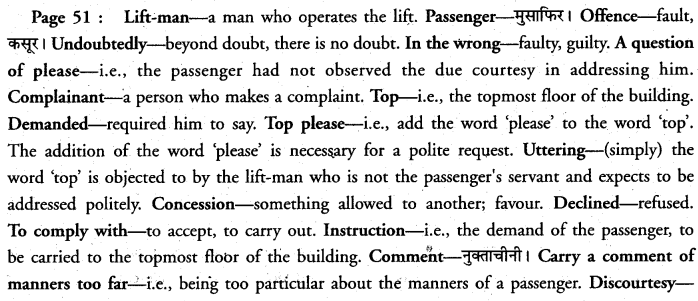
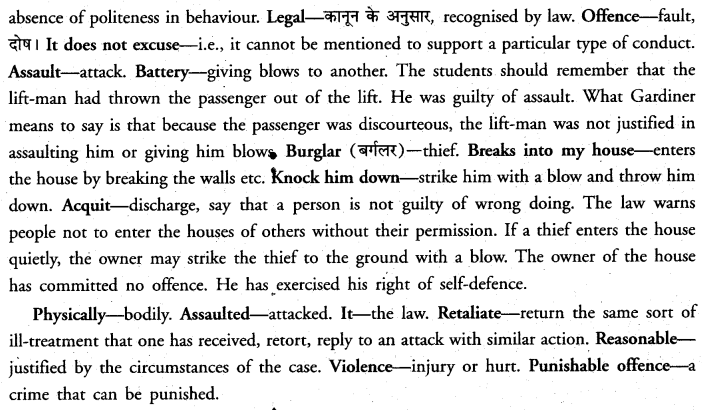
![]()
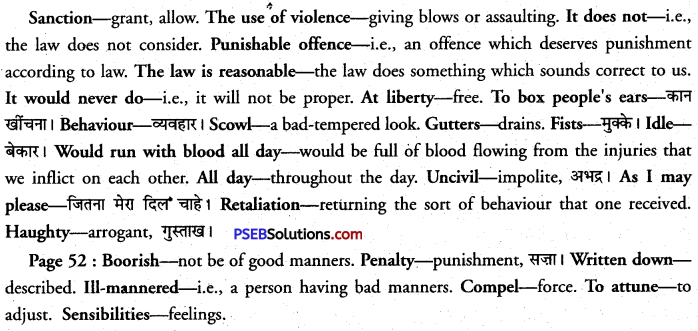
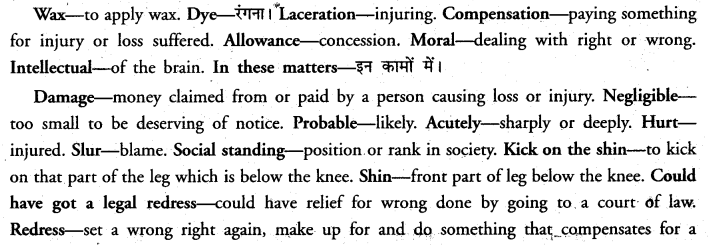
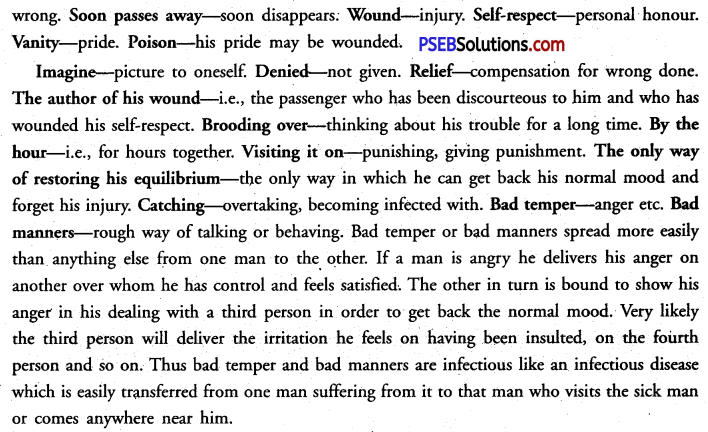
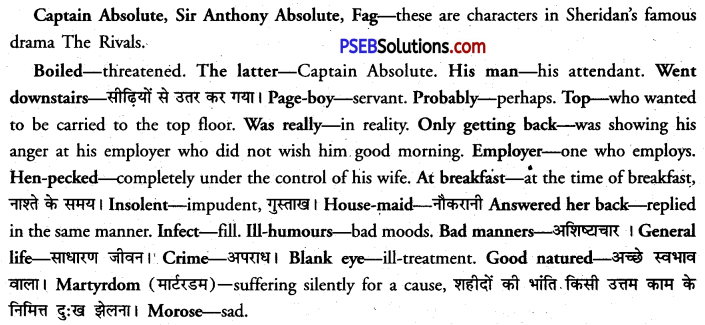
![]()
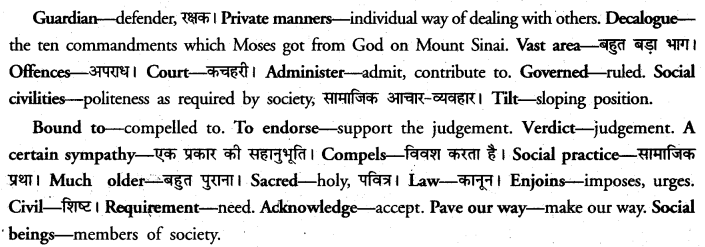
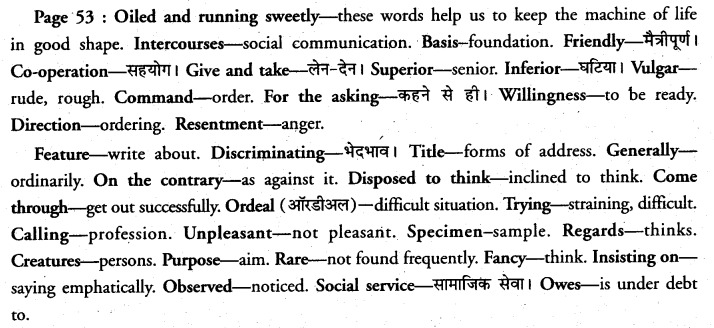
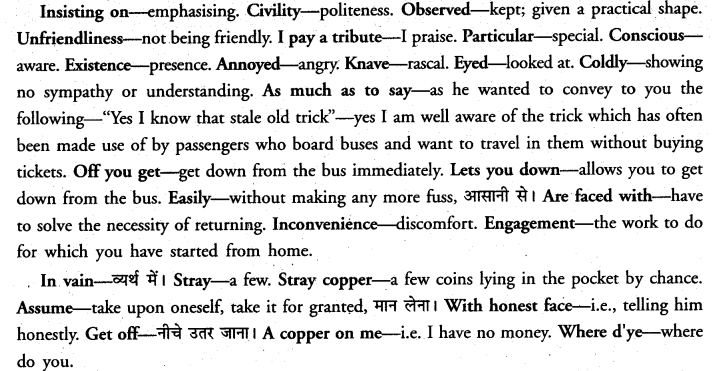
![]()
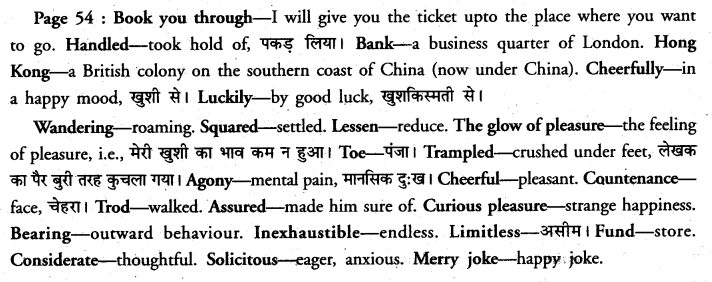
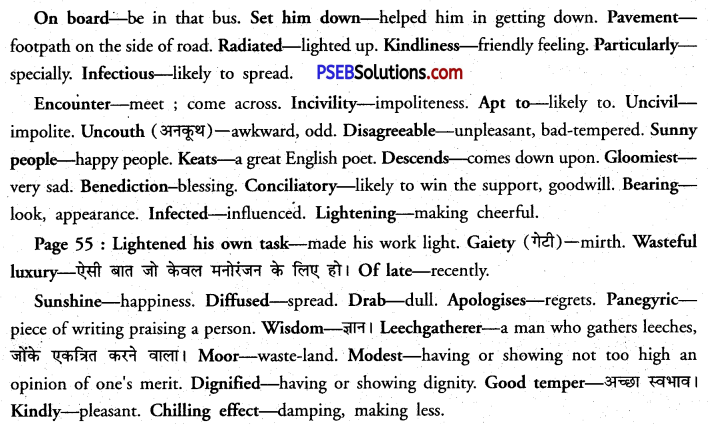
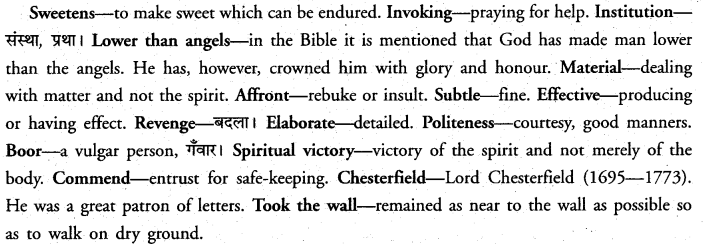
![]()
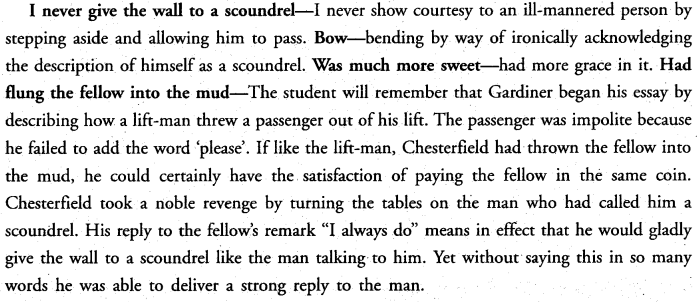
A Rainbow of English 12 Class Guide Prose
- Hassan’s Attendance Problem Question Answer
- The March King Question Answer
- Thinking Out of the Box: Lateral Thinking Question Answer
- Robots and People Question Answer
- On Giving Advice Question Answer
- On Saying “Please” Question Answer
- The Story of My Life Question Answer
- Two Gentlemen of Verona Question Answer
- In Celebration of Being Alive Question Answer
- Ghadari Babas in Kalapani Jail Question Answer